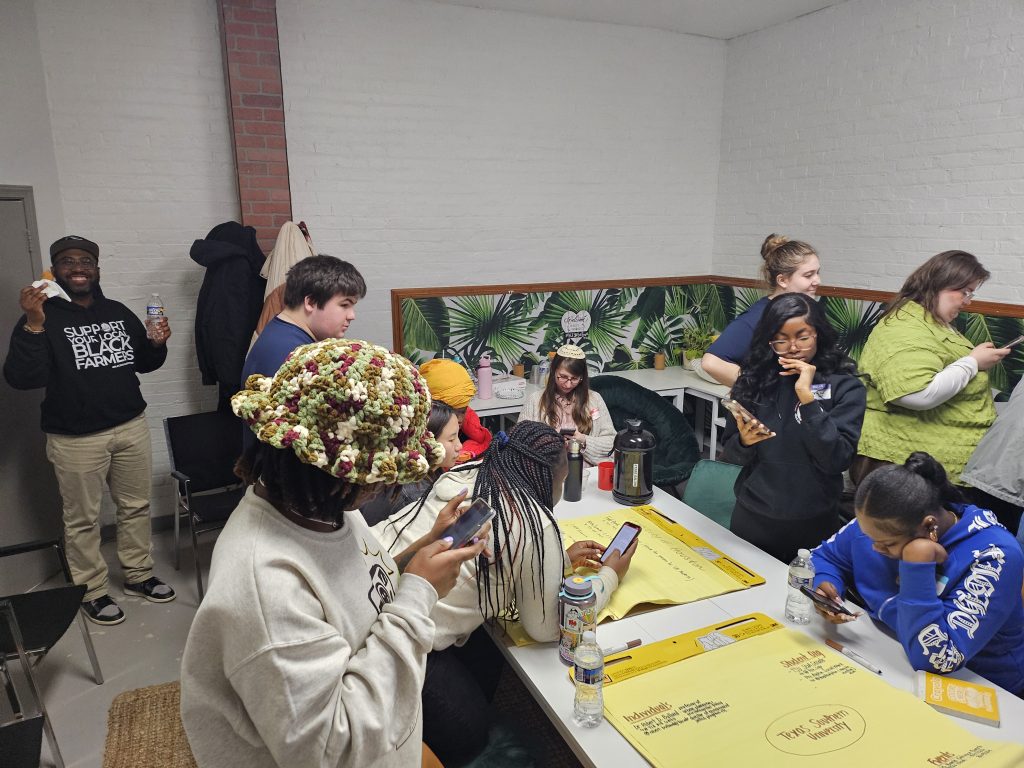Zoe Kemp ’24
It is almost impossible not to feel joyful when you are witnessing the Black Church Food Security Network in all its glory, hearing about its successful 250 congregation outreach, interacting with its staff including Executive Director Linneal, Executive Assistant Brahein, and fellows Shawne, Azaria, and Nash, and while helping unbox merchandise and organizing a space. You feel its mission at every step of the way, and perhaps you envision yourself with a successful mission of your own, if only for a brief moment. This is something Rev. Heber Brown mentioned while we were sat down for a delicious lunch after helping them organize a room piled high with boxes, and having a “detective session” with Rev. Brown in helping him brainstorm ways of connecting a community in Houston, Texas.

After learning some members of the FFJ cohort are first years, he gave advice to “follow your mission”. Perhaps, instead of fixating so much on our majors, and the actionable steps that come with becoming a biologist/doctor/psychologist… whatever it may be, that we could instead turn toward the things we are truly passionate about in the world, and we could follow those steps. This is just one instance of the multitude of knowledge, wisdom, and passion that the Black Church Food Security Network embodies. They live and breathe food, faith, and justice, and it is just inspiring to witness. Rev. Heber Brown lead us through his views and the history of community organizing, and let us ask him questions about food apartheid, how best to organize, how to handle challenges and focus on the systemic issues that underline food insecurity in Baltimore and all around the country. And of course, because Rev. Heber Brown is Rev. Heber Brown, he was so enthusiastic to answer our questions and provide inspiring takeaways for us, including his philosophy around organizing with respect to food insecurity, saying: “We don’t feed the needy, we give the hungry the ability to feed themselves.” Rev. Heber Brown also emphasized this aspect of learning the needs of a community, and not just working on the immediate, emerging issues (although those are essential too). Although, sometimes you have to meet people where they’re at, and sometimes that’s giving someone a meal before you discuss structural issues. He cited the three A’s: Access, Agency, and Autonomy. He told us that many organizations, especially churches, focus simply on access to food when trying to tackle food insecurity. By empowering communities to have the ability to grow their own food and control the food that’s in their community, it creates an economy fed by the work of Black farmers and Black communities. This is also known as asset-based community leadership, done for us, by us. Maybe this is the true mission of organizing, the true mission of the work done by BCFSN.
I truly could include every single snippet of conversation and activity that resonated with me, but this blogpost would read more like an essay instead. But perhaps the largest takeaway I personally had, aside from just pure gratefulness that comes with being able to meet the people running the organization and being able to learn from them, was the underlying feeling that community organizing can be and is accessible to the average person with a mission. Of course, that’s not to undercut the work that organizers do—it is a skill for sure, and watching Rev. Heber Brown is like taking a masterclass in it—but working alongside him and as a group really showed me the power of collective action, and how accessible it can be. In one session, we were able to take an actionable step closer towards getting a community in Houston more connected to potential community partners on local college campuses. Ultimately, if you have a mission, and surround yourself with and familiarize yourself with people who have similar missions and combine forces, nearly anything is possible. You, yes you, have the ability to make change, if you simply look to see what’s around you.